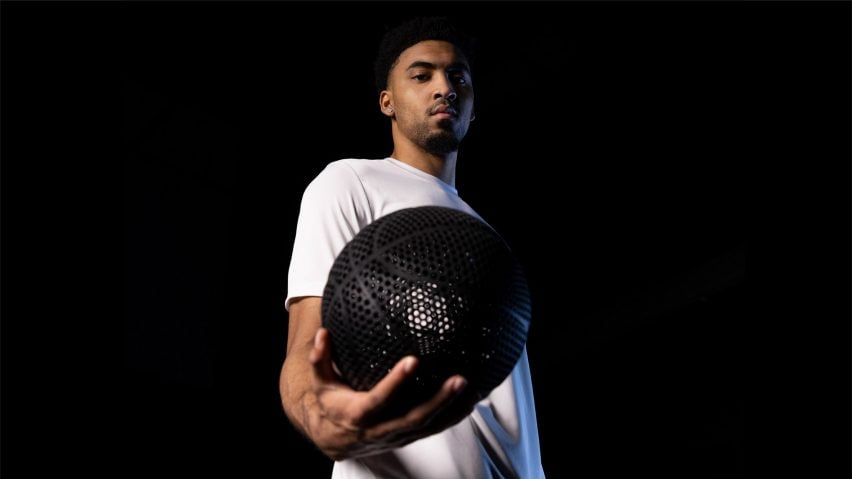A phone charger for rough sleepers, a basketball that never goes flat and glasses that instantly change prescription are among this year's top product designs, which we've rounded up as part of our review of 2023.
This is a year that saw designers turn their attention to solving some of the world's most pressing problems, from the rise of climate change-linked disasters to waste pollution from single-use items and the energy expenditure of buildings.
Others have brought style to solar-powered devices and accessibility to overlooked everyday objects.
Read on for Dezeen's top 10 product designs of 2023:
Created by designer Luke Talbot during his studies at Central Saint Martins, MyPowerbank is a prototype portable charger that can be hooked up to rental bikes to allow people experiencing homelessness to charge their phones for free.
The charger was designed to slot onto London's rental cycles, taking advantage of the fact that, without having to pay to hire it, the bike's chain moves when pedalling backwards, turning into a tiny generator.
Find out more about MyPowerbank ›
Bottlecup founders Kate and Mark Arnell tasked multidisciplinary agency Seymourpowell with helping them design a single item that could replace both disposable water bottles and coffee cups.
The resulting product features a stainless steel water bottle that slots inside a vacuum-insulated cup, while the cup's lid can be stored in the base when not in use.
Find out more about Bottlecup ›
Created by a group of design graduates from London's Royal College of Art, the PulpaTronics RFID tag is entirely made of paper, with a conductive circuit marked into it by laser.
The goal is to replace the billions of RFID tags currently used by the retail industry each year and made with metal and silicon components that prevent the tags from being recycled. The prototype design was the winner of sustainable design (consumer) of the year in the 2023 Dezeen Awards.
Find out more about PulpaTronics RFID tags ›
Following in the footsteps of airless tyres, Wilson's 3D-printed basketball does not need to be inflated and instead gets its bounce from its lattice structure, made of elastomeric polymer.
The ball is currently a prototype and Wilson is undertaking further research before releasing it as a product, at which point players won't have to worry about having their ball go flat or getting an air pump.
Find out more about Wilson's airless basketball ›
32°N adaptive focus sunglasses by DeepOptics
Another Dezeen Awards winner, this time in the product design (consumer design and wearables) category, the 32°N sunglasses feature a technology called pixelated liquid crystal (LC) lenses that allows the prescription of the lenses to be electronically controlled.
The innovation has several potential applications, but it is first being used on these adaptive focus sunglasses, where a reading prescription is activated with a swipe on the side of the frame.
Find out more about 32°N sunglasses ›
Sunne light by Marjan van Aubel
Made by designer Marjan van Aubel for Dutch lighting brand Sunne, this light is designed for suspension in front of a window, where it draws all its power from solar energy.
The linear shape is informed by the appearance of a horizon and it glows with coloured light in a choice of settings that mimic sunlight at different times of the day.
Start-up Water-Filled Glass makes panes of glass filled with water to harness sunlight for heating and cooling. The warmed water is pumped through sealed pipes to warm colder areas of the building, while the glass also limits solar heat gain.
The innovation saves energy and potentially allows buildings to be heavily glazed without significantly compromising their sustainability.
Find out more about Water-Filled Glass ›
Lemmo One bike by Lemmo and Springtime Design
Lemmo One is both an electric bike and a conventional mechanical bike, with the conversion achieved via a removable battery pack that attaches to the frame and a hub motor on the back wheel that can be disengaged so as not to block normal pedalling.
The design gives Lemmo One a longer potential lifespan than e-bikes tend to have due to failures of their electronic parts.
Find out more about Lemmo One ›
Accessories toothbrush handles by Landor & Fitch
Designed to be not just accessible but desirable, the Accessories handles are intended to make toothbrushing less painful for people with limited dexterity.
Each customer is matched to their ideal handle based on an online questionnaire that asks them to consider what household objects they find easiest to grip, and the product is then 3D-printed on request, maximising personalisation and minimising waste.
Find out more about Accessories ›
The ForestGuard system uses sensors and satellites to detect wildfires in their very earliest stages, helping to fight a type of natural hazard that is being exacerbated by climate change.
The company can also use data from the sensors to predict fires before they start, giving firefighters the chance to carry out preventative measures. The winner of the James Dyson Award in Turkey, ForestGuard was created by a group of recent design graduates and is already on the market.
Find out more about ForestGuard ›
This article is part of Dezeen's roundup of the biggest and best news and projects in architecture, design, interior design and technology from 2023.

